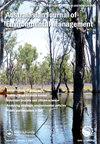Ethics requirements for environmental research
IF 1.5
4区 社会学
Q4 ENVIRONMENTAL STUDIES
Australasian Journal of Environmental Management
Pub Date : 2023-04-03
DOI:10.1080/14486563.2023.2217152
引用次数: 0
Abstract
ABSTRACT Research into the best forms of conservation management or climate intervention is critically important, but carries its own risks of impacts. Unless research requires a legal permit, evaluation of whether the benefits of such research outweigh risks is left to research ethics processes. We ask whether the ethics processes governing outdoor research in Australia ensure that potential environmental impacts are addressed adequately. We examine how environmental considerations are incorporated into Australia’s research ethics governance framework 25 years after the Australian Science, Technology and Engineering Council issued national guidelines for the ethical conduct of environmental research. These guidelines have not been incorporated into national research ethics frameworks or institutional processes. Current ethics codes apply only partially to environmental research and no research institution has developed its own processes or body for considering the environmental impacts of research. The national guidelines are partially reflected in protected area permitting requirements, but these lack explicit mechanisms for ethical deliberation. We conclude that the national guidelines remain relevant today. We stop short of recommending new formal ethics requirements, but encourage researchers and research institutions to consider how the deliberative procedures and substantive principles reflected in the ASTEC Guidelines might be relevant to their work.环境研究的伦理要求
摘要研究最佳形式的保护管理或气候干预至关重要,但也有其自身的影响风险。除非研究需要法律许可,否则评估此类研究的收益是否大于风险将留给研究伦理过程。我们询问澳大利亚户外研究的伦理程序是否确保充分解决潜在的环境影响。在澳大利亚科学、技术和工程委员会发布环境研究伦理行为国家指南25年后,我们研究了如何将环境考虑纳入澳大利亚的研究伦理治理框架。这些指导方针尚未纳入国家研究伦理框架或体制程序。目前的道德规范仅部分适用于环境研究,没有任何研究机构制定自己的程序或机构来考虑研究对环境的影响。国家指导方针部分反映在保护区许可要求中,但这些要求缺乏明确的道德审议机制。我们的结论是,国家指导方针今天仍然具有现实意义。我们没有建议新的正式道德要求,但鼓励研究人员和研究机构考虑ASTEC指南中反映的审议程序和实质性原则如何与他们的工作相关。
本文章由计算机程序翻译,如有差异,请以英文原文为准。
求助全文
约1分钟内获得全文
求助全文
来源期刊

Australasian Journal of Environmental Management
ENVIRONMENTAL STUDIES-
CiteScore
2.60
自引率
0.00%
发文量
16
 求助内容:
求助内容: 应助结果提醒方式:
应助结果提醒方式:


